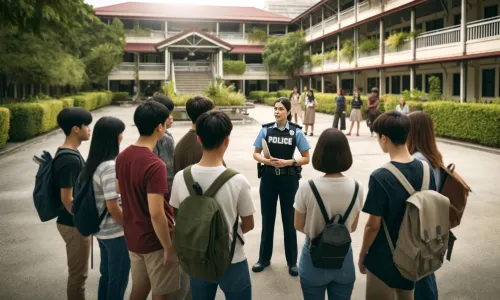Answers For What it is like to be a police officer
Answers and detail explain for What it is like to be a police officer
Explain
What it is like to be a police officer

Listening 2:
Hello, everyone. Thank you for inviting me to give a talk in this series of employment lectures. I’m here this evening to tell you about my job. I’m going to tell you what I like about it, what I don’t like about it and what I hope to do in the future. OK … Well, 1I’m a police officer. I’ve been in the police for just over five years and part of my job is to give talks to students about police work. People often ask why I joined the police. So maybe I’ll start there …2I’ve always been interested in law and order, so I went to study law at university. But … mmm … when I got there I realized that 3I was more interested in the practical side of law than the theory. So, I applied to work with the police force in my spare time. 4Then, as soon as I graduated, I was accepted for training.
As you know, our job is to protect the public from criminals and defend the law. 7So, obviously, the police force has to work every day of the week, day and night. This means we’re often at work when everyone else is relaxing with friends and family, and 6we can’t always be around for special occasions, like birthdays and New Year’s Eve. On top of that we have a lot of extra work at weekends, especially when there’s a football match and the fans are out celebrating. So our working hours are one disadvantage of police work. A lot of the time we have to work with the public to avoid problems, and we get special training for that. But we can’t always prevent trouble, so another disadvantage of the job is the danger… 5I mean, we know that some of the people we have to arrest will attack us.
Now for the advantages … 8Well, one of the advantages is that police work is well‐paid. As I’ve said, it’s a difficult job, and police officers work hard for their pay. But there are many more advantages … for example sometimes the work’s fun, 9especially when we have to protect famous people from their own fans! I’ve met quite a lot of celebrities in my job and I must say I enjoy seeing them close up and finding out what they’re really like as people. But, for me the biggest advantage is the job satisfaction. Speaking for myself, would say I get the most job satisfaction when I help someone or solve a problem in a community. And in the future, 10I’d like to train to be a detective. I think I’d be good at that.
employment lecture Employment /ɪmˈplɔɪmənt/ + lecture /ˈlektʃər/: việc làm + bài giảng = bài giảng về chuyện đi làm
realized /ˈriːəlaɪz/ (v): nhận ra..
practical side Practical + side: thực tế + khía cạnh -> khía cạnh thực tế
theory /ˈθiːəri/ (n): Lý thuyết
spare time /sper/: thời gian rảnh
criminal /ˈkrɪmɪnl/ (n); tội phạm
be around: cái gì đó/ ai đó họ ‘có mặt’ (I knocked the door but there was no one around.)
occasions /əˈkeɪʒn/ (n): dịp/ một dịp nào đó
disadvantage /ˌdɪsədˈvæntɪdʒ/ (n): bất lợi
arrest /əˈrest/ (v): bắt giữ
attack /əˈtæk/ (v): tấn công
well-paid Well + paid: tốt + ‘được’ trả -> được trả lương cao
satisfaction /ˌdʒɑːb sætɪsˈfækʃn/: sự hài lòng trong công việc
detective /dɪˈtektɪv/ (n): thám tử
You will hear a woman talking to some students about her job. Complete the notes with words from the recording. Write NO MORE THAN TWO WORDS for each answer.
Job: 1 (police officer) for five years
Studied: 2 (law) at university
Interested in 3 (practical) side, not theory
Accepted for 4 (training) after graduating
Now you will hear the next part of the talk. Choose THREE answers from A-F. What does the speaker think are the disadvantages of police work?
A.
B.
C.
D.
E.
F.
Listen to the last part of the recording and answer the questions. Write no more than TWO WORDS
About Question
What does the speaker think about the financial rewards of police work? 8 (well-paid | well paid)
What kind of people do the police sometimes have to protect? 9 (famous people | celebrities)
What does the speaker want to be in the future? 10 (a detective | detective)
![[Forecast Q2-2025] - Biology lecture](https://static.helik.app/reading/8fd3d7d2-ccf9-47a3-8920-2e7a3b0d6607)
![[Forecast Q2-2025] - Living in the City](https://static.helik.app/reading/1a60bcf3-f3a7-4e9b-97a2-94d156a0de3b)
![[Forecast Q2-2025] - Student Union](https://static.helik.app/reading/fb443123-8c1d-447e-8c79-5a01650f4754)
![[Forecast Q2-2025] - Fruit-picking Job in an Orchard](https://static.helik.app/reading/e1968346-6c55-44ae-b8d3-f6a4fb7207b9)
![[Forecast Q2-2025] - University Crime Prevention](https://static.helik.app/reading/bdda593e-16d6-4c72-8a12-b116e917b27c)
![[Forecast Q2-2025] - Business Course](https://static.helik.app/reading/3308e282-99a6-4bcb-9d22-0b488701d968)
![[C20T1] - Choosing a restaurant](https://static.helik.app/reading/e9b21123-c43c-42fb-88b7-5d0be3a37e03)
![[Helik Collect] - Car Club Scheme](https://static.helik.app/reading/6a749ba0-4cde-47fe-8260-f65b0599c3bf)